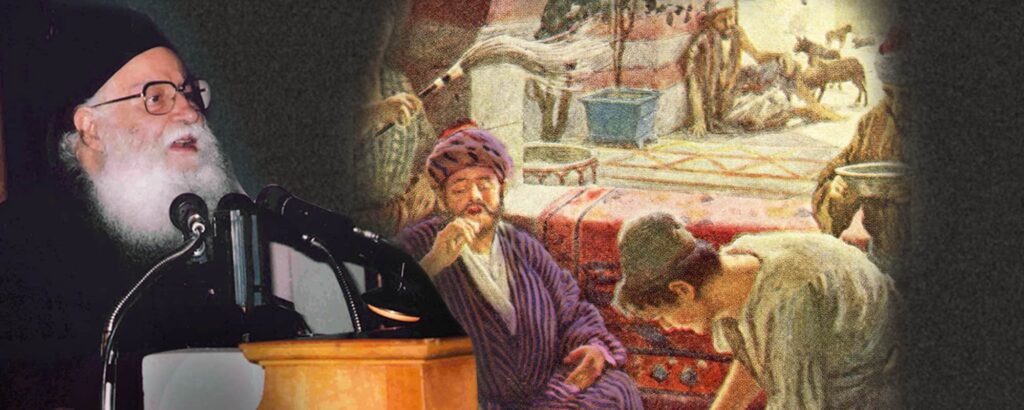
THE RICH MAN AND LAZARUS PSYCHOANALYZED
The Rich Man and Lazarus psychoanalyzed - Fr. Athanasios Mitilinaios
Fifth Sunday of Luke (Luke 16:19-31), Homily Β323
The parable of the rich man and Lazarus which we heard in today’s Gospel passage, my beloved, is a fictional story, which the Lord told as a reply to the Pharisees.
The Evengelist Luke notes: “Now the Pharisees, who were lovers of money, heard all these things; and they ridiculed Him.” (Lk. 16:14). (They ridiculed Him every time He spoke about voluntary poverty.) “And He said to them: ‘You are ones who justify yourselves before men, but God knows your hearts; for what is esteemed by men is an abomination before God. (Lk. 16:15) The Lord also told this parable to show them that they should not boast about their riches, their honor, their nobility, etc., because the scenery changes after death, the dwelling place changes. He also said that there are two dwelling places. One on Earth, this present life. The other in Heaven, after death. It is from here precisely that the Lord develops this parable.
As always, every word of the Lord is of great significance. With this parable, He does not want to teach just one thing, but also other things from other angles. The word of God is never exhausted. It is significant to note that, in every age, more and more is perceived in Holy Scripture, there is always something new to discover, an answer to offer us. Let us offer, then, a psychoanalysis of the two persons in the parable, beginning first with the rich man.
The Evangelist writes: “There was a man who was very rich, he wore fine linen dyed in purple and who feasted sumptuously every day. (19) (Purple was the color of kings in those days and was very expensive. The fine linen was an exclusive type of cotton from Egypt, certainly very expensive in those days also.) A rich man, like all rich men, this one included, lives well and is involved in politics. Exactly how this rich man acquired his wealth is not mentioned in the parable. Perhaps by fraud. Perhaps honorably. But this has no bearing here. His sin is not that he is rich, because God is also rich. And Abraham, who will enter as a third party in this parable, was not simply rich, but super rich. However, at no time in his life did Abraham ever make the acquisition of wealth the goal of his life, and because he did not make this the goal of his life, consequently, he was not attached to earthly wealth.
In his letter to the Hebrews, the Apostle tells us that Abraham “looked for a city that has foundations, whose architect and builder is God” (Heb 11:10). Which city is this, whose architect and builder is God? It is the Kingdom of God. That is, he lived on Earth but his mind was in Heaven. He accepted, received and awaited the Kingdom of God. We read elsewhere that he acquired no land at all, not even a piece the size of his foot (Acts 7:5). Why not? Because Abraham was always saying that he was a foreigner and a sojourner (Gen 23:4) – not in the land of Canaan, where God told him to settle permanently (Gen 17:8) – but in this present world. It is remarkable that we find Abraham in a parable where the Lord said he was in Paradise. This is what is remarkable: Truly, Abraham had gained Paradise.
We could say that He used the structure of the parable to open a dialogue between two wealthy men, Abraham and the rich man, who, after death, certainly did not go to Paradise, but to Hades. “A great chasm,” Abraham says, “has been established between you and us. We can neither go to you, neither can you come to us” (26). It is astounding. This dialogue between Abraham and the rich man in the parable shows that wealth is not something evil in and of itself, but rather, one’s attitude toward the wealth. Since the goal in life for a rich man is to acquire wealth, whatever wealth he may acquire, naturally, is for him to enjoy – all the good things in life.
First, he felt the need for a sense of security... As it is says in another parable, “I have much good stored up for many years” (Lk. 12:19). A rich man always has this feeling of security, because he has lots of money. Whether he is hungry or whatever else he might encounter, everything will go his way, because he has the money. (This is, of course, a delusion, because wealth comes and goes. Money is most unreliable. It changes hands with great ease; it leaves my pocket and goes into someone else’s.) This is how a rich man has a sense of security. He desires to be rich in order to feel secure.
He also wants to enjoy the comforts riches provide, to live "the good life”, to eat and drink well. Living this life, what does he say? “Everything is going well.” How does he feel? “Everything is for me.” Thus, little by little, an egocentric personality forms in a rich man, and the world must revolve around him. In the egocentric man there is no room for anyone else, not even God Himself. To the contrary, God must revolve around the him, to grant his every wish.
This is how a rich man seeks God: He makes his cross, he lights a candle, to assure himself that he is in God’s favor, for him not not to lose his possessions. You see, then, a person whose religiousness is self-seeking, whose religiousness is, in the eyes of God, of course rejected.
How does he think? Like one of the boys today who expect money from his father. I heard one boy say to another: “Look, your dad has to give you money for bringing you into this world!” It is the same with the foolish rich man. What does he say? “God is obligated to give me good things.” Moreover, he also becomes the hedonistic type. St. Theophylacht comments:
Not only was the rich man clothed in purple and fine linen, but he enjoyed every other delight; he feasted, not now and then, but every single day! And not in moderation, but sumptuously.”
St. Theophylacht renders “sumptuously” [λαμπρῶς] as “prodigal and extravagant”. And what is a hedonist essentially? A materialist; an idol worshiper. He worships what is material; he worships the flesh.
It follows that he is a heartless man. He does not take any interest in how someone else is doing. Really, how long was poor Lazarus outside the gate of his house? A very long time. He was not moved, even though he saw him every day from his window and from the balcony of his house, eating the crumbs his servants shook off his tablecloth. He was not moved.
A heartless man is also uncommunicative. He does not have relationships. He is self-centered. Many times, in order to reassure his conscience, he practices traces of religiousness.The rich man in the parable recognizes his ancestor Abraham from Hades and seeks his mercy, shouting, “Father Abraham, have mercy on me!” Of course, there is no way for him to be helped. He did, then, have natural love, but only for his brothers, his close relatives, by showing concern for them not to end up in that place of torment; there was love, but it was limited, only for his relatives. For poor Lazarus, whom he saw there every day on the other side of his gate, he showed no compassion at all, nor love. You see, then, that he did have a trace of humanity. Unfortunately, it was not able to save him.
His life was a portrait of arrogance. His presence certainly provoked the poor. He is an example of what is said in the Psalms, “It is the rich who make the poor burn” (Ps. 9:23). It is this fire of jealousy that makes the poor envy and wish evils for those who enjoy the good things wealth provides, while he himself has nothing to eat. “They burn the poor”, it says.
And what is especially noteworthy in this story is this: The rich man has no name. What does it say? The learned Holy Chrysostom comments:
“And where do we find the name of the rich man? Nowhere. He is nameless. How rich he was! yet his name is nowhere to be found...”
Another interpreter, St. Theophylacht, says,
“The man was unworthy of being given a name by God.”
And something more from a third interpreter:
“It is written about evil-doers: ‘...do not let their names pass through my lips when I remember them.’” (Ps. 15:4b)
God knows all things, yet this is what He says: “I do not wish to remember” (of course God cannot forget; it is an expression). We also use this expression: “I don’t ever want to hear his name again!” And we say with contempt another expression: “I don’t want to have anything to do with him”. This is what God is saying: “I do not want to remember the name of this sinner, nor will I even mention his name with my lips”. So then, the rich man in the parable is nameless. That is, he had no personhood, for a name is what makes a person.
And now we come to the personality of the poor man Lazarus. The parable provides a sufficient description of him. He was poor. Whether he was born into poverty or not, we do not know. In any case, he was not poor from prodigal living, because there is a certain reverence in his character. (It happens many times that the poor are isolated from society because of their poverty, without them being responsible, of course, for their poverty.)
What makes this poor man a person is that he was given a name. He was called Lazarus. And the name “Lazarus” has a meaning: “God is my help” (Ps. 17:3, Ps. 61:8). Someone may ask: Since God was his help, why didn’t He deliver him out of poverty? Why didn’t He heal his sores, which it says “he was covered with”? Why not? I have said it before and I will say it again: We must change our understanding about what divine help is.
Divine help does not mean for God to take away my poverty, to take away my sickness, or to change my adverse situations. God’s help is, rather, to help me endure all these things, that I might see the face of God. This is what it means to be helped, to be saved. St. Theophylacht also comments: “The poor man’s name is remembered”. And do you know that it is the only name given in all the parables? It is a unique case.
Allow me to open a brief parenthesis, because a parable has many interpretations. You know that another Lazarus, the brother of Mary and Martha, was risen from the dead after being dead for four days. Not only did the Jews not believe, they even called a council together to prevent the miracle of Jesus Christ from being made known, because, it says, all of Judea went to Bethany to see Lazarus who had been resurrected (Jn 12:9). And the wretched ones plotted to murder Lazarus also. (Jn. 12:10) Did they believe? No. This is why the Lord gave the name in this parable, as if He wanted to say to the Jews: “Lazarus was resurrected, and you did not believe.”
The parable continues and builds up another aspect. Abraham says to him, “My child, if they do not accept Moses and the Law and the Prophets, they are not going to believe, even if someone resurrected from the dead goes to warn them.”
Lazarus was resurrected. The Lord worked this miracle for them. They saw the resurrected man. Did they believe? Perhaps they might have said,“Do it again, in front of us this time,” as they premeditated His murder.
Christ gave them a reply. He used a parable which consisted of a poor man at the gate of a rich man’s house, and composed an animated dialogue with the rich landowner. Beside sitting there, the poor man offered no other testimony. He did not protest for equality. He did not insult the rich man. He did not seek to enjoy the kind of life inside his mansion. Not once did he ever lift his fist (the contemporary symbol of social equality). He never had enough food; all he ate was the rich man’s table scraps, which he picked out of the trash. What does this show? He had great humility. And not only was he poor, but sick as well, covered with sores. His condition is why he was isolated by society. They despised him. He was covered with open sores. The stray dogs were his companions. Only the dogs showed a friendly disposition toward him.
It appears that poverty puts one closer to the Creator. It shows us a way to live that is in accord with man’s nature. A child who is poor gets dirty playing outside. This is closer to his nature than whatever games a rich kid may play. Wealth, if you think about it, pushes a human being away from natural human behavior. Poverty brings a man closer to what is natural. His food is also more natural, and his behavior is more natural. Wealth creates an artificial world, a phony world.
In poor Lazarus, however, we find a desirable virtue, holy silence! In holy silence, which has much to say, we discover the mystery of the human person. We see the Lord also keeping silent. “Do you not answer me?”, Pilate said to Him. “But He was silent” (Mk. 14:61), precisely because he had much to say. The one who is silent has much to say.
Finally, the presence of the poor man sitting across from the rich man was a challenge to wealth, a challenge which should have left an impression on the rich man, making him feel ashamed; he should have covered his face before Lazarus’ poverty. When shame is absent, the challenge appears.
Today, beloved, with this parable of the rich man and Lazarus, the Lord shows us two personalities, concerning two stations in life, two different attitudes toward God and fellow human beings. Having these in front of us, we should reflect on ourselves. As we said, neither wealth nor poverty are good in and of themselves. They simply offer two opportunities for a man to improve his character.
Being poor and being wealthy are two different stations in life that create their own dynamic, we could say, whereby a human being can show concern and genuine human love for others. The difference in stations is not to blame, but social confinement, which breeds hostile relations, murder, hate and war. The parable of the rich man and Lazarus is, my beloved, a thumbnail sketch of two personalities; we must study them and learn how we must behave before God and man.


